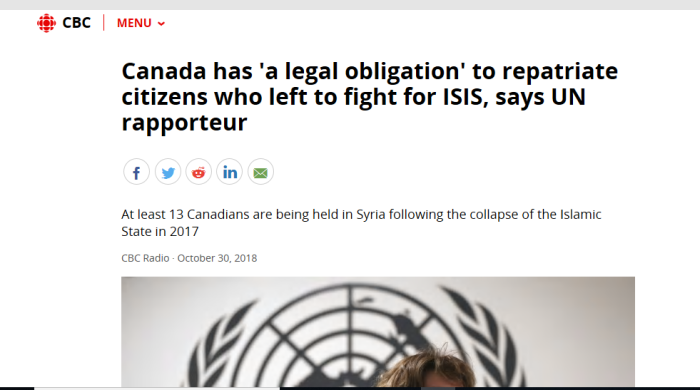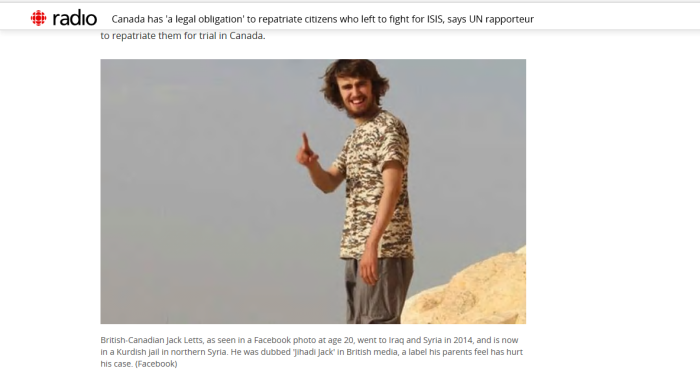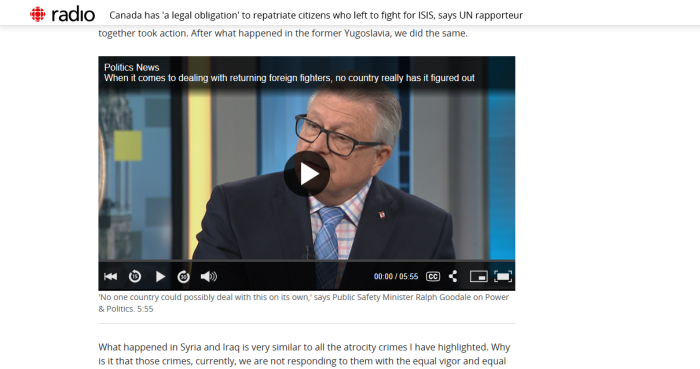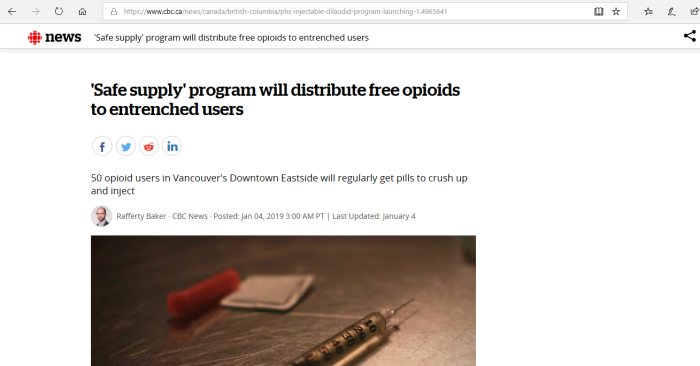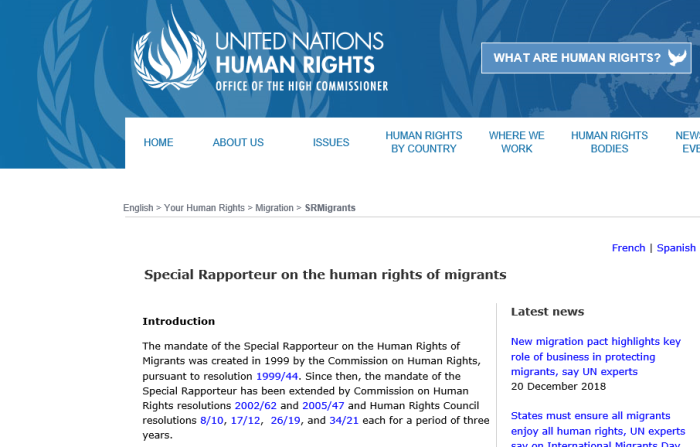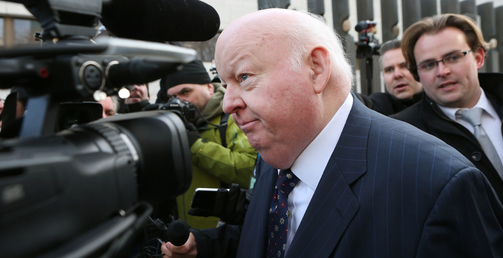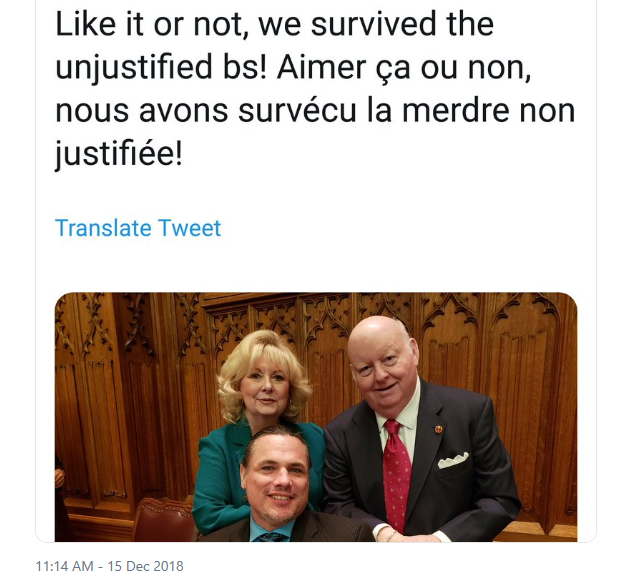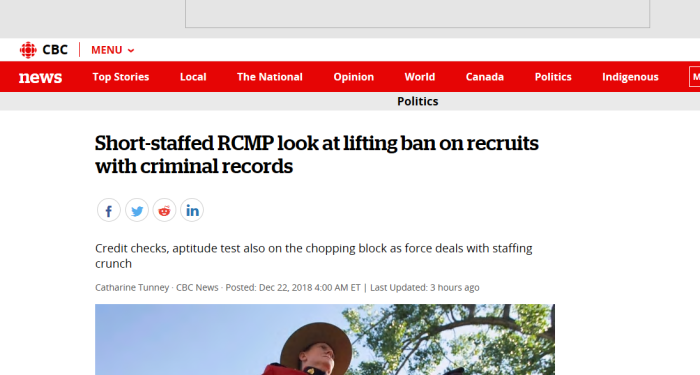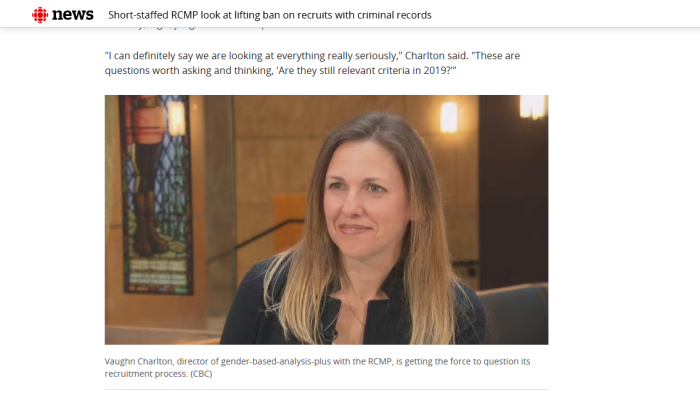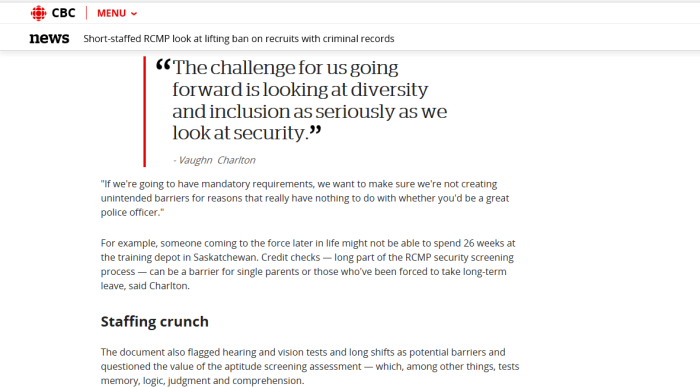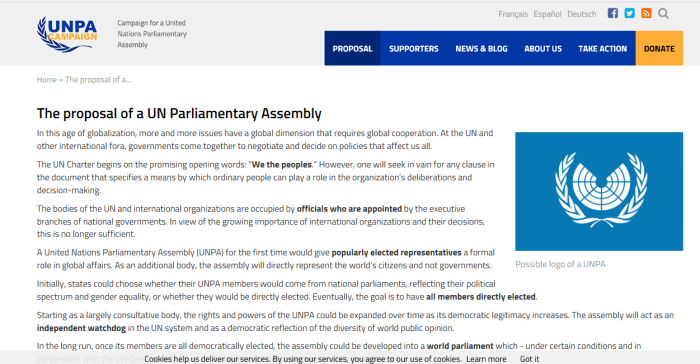
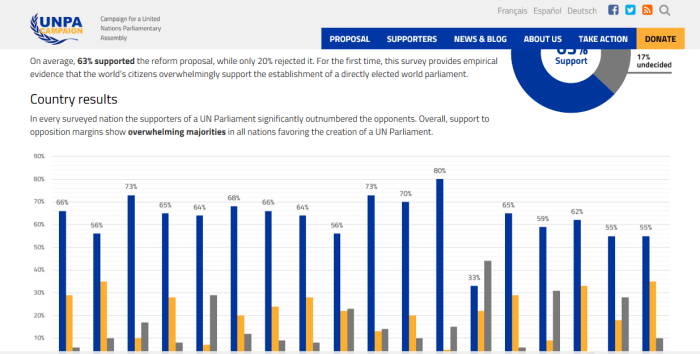
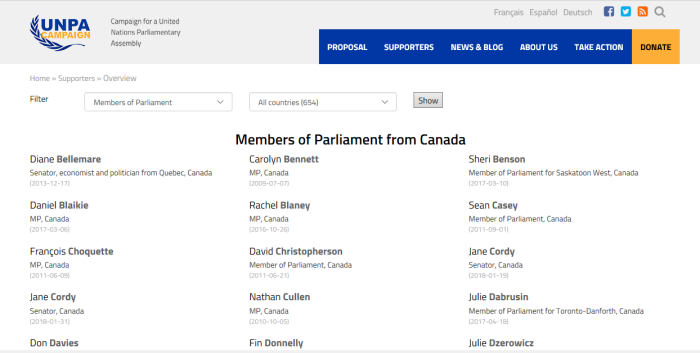
(The globalist UN, showing its true colours once again)
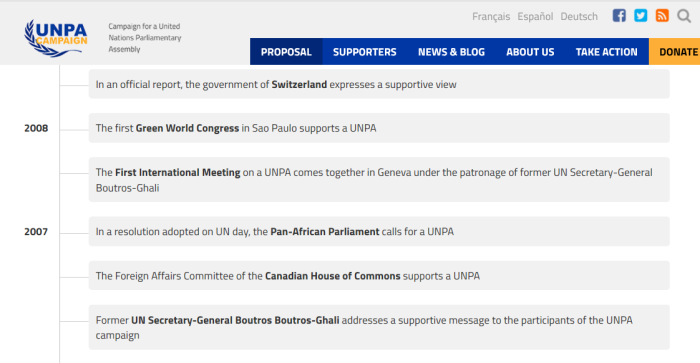
(In 2007, the Canadian House of Commons Foreign Affairs Committee voted to endorse the idea of the UN Parliament. Stephen Harper was Prime Minister. Self-identified “populist” Maxime Bernier would soon be the Foreign Affairs Minister, and say nothing.)
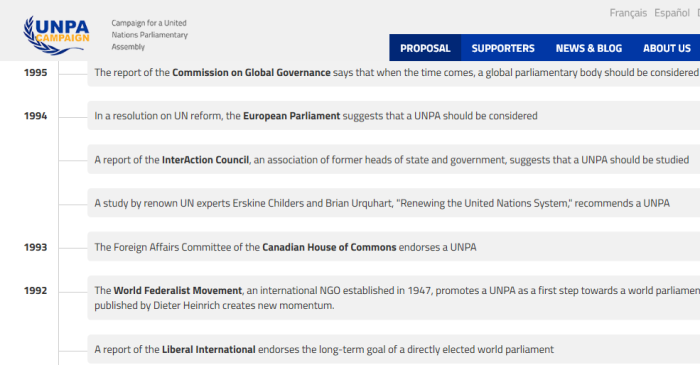
(Seriously, this was previously approved in 1993?)
(1) https://en.unpacampaign.org/proposal/
(2) http://archive.is/GMgwO
(3) https://en.unpacampaign.org/supporters/survey/
(4) http://archive.is/KpIqW
(5) https://en.unpacampaign.org/supporters/overview/?mapcountry=CA&mapgroup=mem
(6) http://archive.is/P7ZS9
(7) https://en.unpacampaign.org/meetings/november2007/
(8) http://archive.is/NKaj8
(9) http://archive.is/kRdVJ
(10) https://en.unpacampaign.org/meetings/november2008/
(11) http://archive.is/z1jUo
(12) http://archive.is/tNX9Z
(13) https://en.unpacampaign.org/239/establishment-of-a-global-parliament-discussed-at-international-meeting-in-new-york/
(14) http://archive.is/5lMyX
(15) http://archive.is/dXbo6
(16) https://en.unpacampaign.org/265/declaration-calls-for-intergovernmental-conference-on-un-parliament/
(17) http://archive.is/dXbo6
(18) https://en.unpacampaign.org/311/post-2015-agenda-should-include-elected-un-assembly-to-strengthen-democratic-participation/
(19) http://archive.is/xloAX
(20) archive.is/I4Mtb
(21) https://en.unpacampaign.org/files/declaration/en.pdf
To all the conspiracy theorists who believe that the UN is proposing setting up a one world government, your fears just became validation.
The UN formally proposes to do exactly that.
2. Quotes From Site
The proposal of a UN Parliamentary Assembly
.
The proposal of a UN Parliamentary Assembly
.
In this age of globalization, more and more issues have a global dimension that requires global cooperation. At the UN and other international fora, governments come together to negotiate and decide on policies that affect us all.
.
The UN Charter begins on the promising opening words: “We the peoples.” However, one will seek in vain for any clause in the document that specifies a means by which ordinary people can play a role in the organization’s deliberations and decision-making.
.
The bodies of the UN and international organizations are occupied by officials who are appointed by the executive branches of national governments. In view of the growing importance of international organizations and their decisions, this is no longer sufficient.
.
A United Nations Parliamentary Assembly (UNPA) for the first time would give popularly elected representatives a formal role in global affairs. As an additional body, the assembly will directly represent the world’s citizens and not governments.
.
Initially, states could choose whether their UNPA members would come from national parliaments, reflecting their political spectrum and gender equality, or whether they would be directly elected. Eventually, the goal is to have all members directly elected.
.
Starting as a largely consultative body, the rights and powers of the UNPA could be expanded over time as its democratic legitimacy increases. The assembly will act as an independent watchdog in the UN system and as a democratic reflection of the diversity of world public opinion.
.
In the long run, once its members are all democratically elected, the assembly could be developed into a world parliament which – under certain conditions and in conjunction with the UN General Assembly – may be able to adopt universally binding regulations.
.
In short, the UN should evolve from what many believe to be a generally ineffectual “talk-shop” into a viable democratic and legislative body.
Okay, let’s break this down a bit:
”In this age of globalization, more and more issues have a global dimension that requires global cooperation. At the UN and other international fora, governments come together to negotiate and decide on policies that affect us all.”
So what? This seems to deliberately conflate cooperation with sovereignty. Nations can and do discuss and cooperate on issues all the time. This is a solution to an artificial problem.
”The UN Charter begins on the promising opening words: “We the peoples.” However, one will seek in vain for any clause in the document that specifies a means by which ordinary people can play a role in the organization’s deliberations and decision-making.”
Searching in vain for any clause that says ordinary people can play a role in decision making? Is this a good thing? Shouldn’t people have some ability to influence decision making?
”The bodies of the UN and international organizations are occupied by officials who are appointed by the executive branches of national governments. In view of the growing importance of international organizations and their decisions, this is no longer sufficient.”
How so? Do we not want people who are directly chosen by the host nation to be taking part in such discussions?
”A United Nations Parliamentary Assembly (UNPA) for the first time would give popularly elected representatives a formal role in global affairs. As an additional body, the assembly will directly represent the world’s citizens and not governments.”
Logistical question: how do you decide if a leader is ”popularly elected”? Military dictators frequently hold sham elections and win close to 100% of the vote.
Further, what if the values of a block of nations (such as the 50+ members of Islamic nations) democratically overrule nations which believe in human rights?
”Initially, states could choose whether their UNPA members would come from national parliaments, reflecting their political spectrum and gender equality, or whether they would be directly elected. Eventually, the goal is to have all members directly elected.”
If they are not being directly elected by their people, then who is electing them? Should the UN get to decide who ”represents” the Nation of Canada, the US, Australia, or Japan?
”Starting as a largely consultative body, the rights and powers of the UNPA could be expanded over time as its democratic legitimacy increases. The assembly will act as an independent watchdog in the UN system and as a democratic reflection of the diversity of world public opinion.”
Ah, non-binding and consultative bodies which eventually become legally binding? Kind of like the UN Global Migration Compact.
How exactly would there be ”oversight” when this would effectively take away actual representative government from host nations?
”In the long run, once its members are all democratically elected, the assembly could be developed into a world parliament which – under certain conditions and in conjunction with the UN General Assembly – may be able to adopt universally binding regulations
.
In short, the UN should evolve from what many believe to be a generally ineffectual “talk-shop” into a viable democratic and legislative body.”
How would this possibly be democratic? It takes control even further from the public. If you think your MP or MPP or MLA or Senators don’t represent you now, how would you gain more representation from being even further removed.
3. UN Claims To Have Conducted Research
CLICK HERE, for survey results
Survey on a UN Parliamentary Assembly
survey graphic -donought -readyOn behalf of the British Broadcasting Corporation BBC, in 2004/05 the research institute GlobeScan conducted representative surveys in 18 countries representing 61% of the world population.In one of the questions concerning reforms of the United Nations, participants were asked about their opinion on “creating a new UN Parliament, made up of representatives directly elected by citizens, having powers equal to the current UN General Assembly that is controlled by national governments.”
On average, 63% supported the reform proposal, while only 20% rejected it. For the first time, this survey provides empirical evidence that the world’s citizens overwhelmingly support the establishment of a directly elected world parliament.
Country results
In every surveyed nation the supporters of a UN Parliament significantly outnumbered the opponents. Overall, support to opposition margins show overwhelming majorities in all nations favoring the creation of a UN Parliament.
Let’s see: Only 18 countries were surveyed
UN claims these 18 countries represent 61% of the population.
UN Claims that 63% of populations surveyed support global government
1/ Argentina
2/ Australia
3/ Brazil
4/ Canada
5/ Chile
6/ China
7/ Germany
8/ Great Britain (UK)
9/ India
10/ Indonesia
11/ Italy
12/ Mexico
13/ Phillipines
14/ Poland
15/ Russia
16/ South Korea
17/ Turkey
18/ USA
Assuming the numbers are true, that means that all but 18 countries were left out of the survey
It means that 39% of national populations were not consulted at all
It means that 37% (of consulted nations) oppose the measure.
A better level might be to use (0.63)*(0.61) = .03843 = 38%
(A tad silly, but this research is not representative)
Assuming this research is even accurate, that would mean that only 38% would support such a measure. Of course, the site doesn’t list any of the SAMPLE SIZES, which would help give a more accurate picture.
Were 100 people interviewed in each country? 1,000? 10,000? Can we see the questions that were asked?
Of course, none of this addresses the central question: why is it that there has been no public consultation on us signing away our sovereignty? Shouldn’t we have the final say?
Wait, globalists don’t care what people think. Now it makes sense.
4. Globalist Politicians In Canada
Justin Trudeau, and Elizabeth May are on here. Jagmeet Singh probably would be, if he actually was an M.P.
Members of Parliament from Canada
Diane Bellemare
Senator, economist and politician from Quebec, Canada
(2013-12-17)
Carolyn Bennett
MP, Canada
(2009-07-07)
Sheri Benson
Member of Parliament for Saskatoon West, Canada
(2017-03-10)
Daniel Blaikie
MP, Canada
(2017-03-06)
Rachel Blaney
MP, Canada
(2016-10-26)
Sean Casey
Member of Parliament, Canada
(2011-09-01)
François Choquette
MP, Canada
(2011-06-09)
David Christopherson
Member of Parliament, Canada
(2011-06-21)
Jane Cordy
Senator, Canada
(2018-01-19)
Jane Cordy
Senator, Canada
(2018-01-31)
Nathan Cullen
MP, Canada
(2010-10-05)
Julie Dabrusin
Member of Parliament for Toronto-Danforth, Canada
(2017-04-18)
Don Davies
MP, elected 2008; Lawyer, trade union representative, Canada
(2007-05-25)
Fin Donnelly
MP, Canada
(2010-04-19)
Julie Dzerowicz
MP, Canada
(2017-03-16)
Wayne Easter
MP, Canada
(2012-02-09)
Art Eggleton
Canadian Senator, Canada
(2009-04-28)
Ali Ehsassi
MP, Canada
(2017-04-07)
Nathaniel Erskine-Smith
Canada
(2016-05-12)
Hedy Fry
MP, Canada
(2009-06-15)
Marc Garneau
MP; first Canadian in outer space; President, Canadian Space Agency (2001-2006), Canada
(2012-03-24)
Randall Garrison
MP, Canada
(2012-02-24)
Pamela Goldsmith-Jones
MP for West Vancouver-Sunshine Coast-Sea to Sky Country. Parliamentary Secretary to the Minister of International Trade, Canada
(2017-05-17)
Claude Gravelle
Member of Parliament, Nickel Belt, Canada
(2010-07-29)
Laurie Hawn
Member of Parliament since 2006 Privy Councillor Royal Canadian Air Force Veteran, Canada
(2012-02-16)
Carol Hughes
MP, Canada
(2012-02-16)
Mobina Jaffer
Member of the Canadian Senate, representing British Columbia, Canada
(2009-12-18)
Janis G. Johnson
Senator, Canada
(2009-05-01)
Peter Julian
MP, Canada
(2008-02-25)
Frances Lankin
Senator, Canada
(2016-11-15)
Dr. Hélène Laverdière
Foreign Affairs Critic for the New Democratic Party of Canada and MP for Laurier – Ste-Marie, Canada
(2012-02-27)
Dominic LeBlanc
MP, Canada
(2012-03-01)
Hélène LeBlanc
MP, Canada
(2012-02-28)
Alistair MacGregor
MP, Canada
(2018-02-09)
Brian Masse
MP, Canada
(2009-04-30)
Irene Mathyssen
Canada
(2012-03-12)
Elizabeth May
MP; Leader, Green Party of Canada, Canada
(2007-05-11)
Dr. John McCallum
Canada
(2012-03-13)
The Honourable John McKay P.C., M.P.
Canadian Member of Parliament for the Riding of Scarborough-Guildwood., Canada
(2012-02-28)
Alexandra Mendes
MP, Canada
(2009-04-28)
Don Meredith
Senator, Canada
(2017-03-01)
Maryann Mihychuk
Canada
(2018-02-14)
Wilfred P. Moore
Senator, Canada
(2011-06-21)
Isabelle Morin
MP, Canada
(2012-02-28)
Joyce Murray
MP, Canada
(2009-05-09)
Thanh Hai Ngo
Senator, Canada
(2018-01-22)
Robert Oliphant
MP, Canada
(2009-06-15)
John Oliver
Member of Parliament , Canada
(2018-03-01)
Joe Peschisolido
Canada
(2018-02-21)
Rose-May Poirier
Senator, Canada
(2010-07-02)
Tracey Ramsey
MP, Canada
(2018-02-08)
Murray Rankin
MP, Canada
(2018-01-26)
Pablo Rodriguez
MP, Canada
(2010-05-03)
Dan Ruimy
MP, Canada
(2018-05-07)
Nancy Ruth
Senator, Canada
(2009-05-01)
Francis Scarpaleggia
MP, Canada
(2010-08-19)
Judy Sgro
MP; Canadian Member of Parliament for the Riding of York West, Canada
(2012-04-05)
Scott Simms
MP, Canada
(2012-02-28)
Wayne Stetski
MP, Canada
(2018-04-25)
Dr. Kennedy Stewart
MP, Canada
(2012-02-22)
Justin Trudeau
Member of Parliament, Canada
(2010-07-21)
David Wells
Senator, Canada
(2016-11-22)
Borys Wrzesnewskyj
MP, Canada
(2009-05-01)
Kate Young
MP, Canada
(2018-05-03)
5. First UNPA Int’l Meeting in 2007
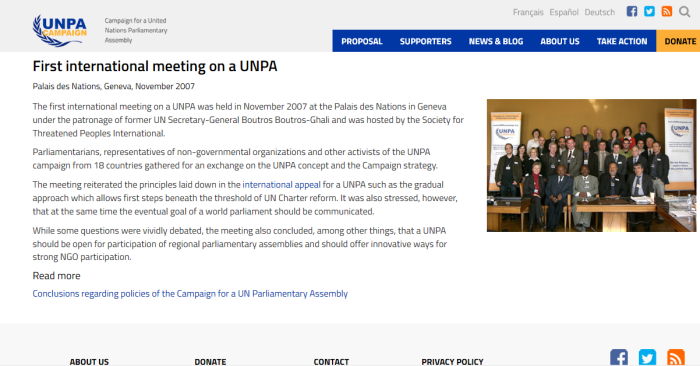
First international meeting on a UNPA
Palais des Nations, Geneva, November 2007
The first international meeting on a UNPA was held in November 2007 at the Palais des Nations in Geneva under the patronage of former UN Secretary-General Boutros Boutros-Ghali and was hosted by the Society for Threatened Peoples International.
Parliamentarians, representatives of non-governmental organizations and other activists of the UNPA campaign from 18 countries gathered for an exchange on the UNPA concept and the Campaign strategy.
The meeting reiterated the principles laid down in the international appeal for a UNPA such as the gradual approach which allows first steps beneath the threshold of UN Charter reform. It was also stressed, however, that at the same time the eventual goal of a world parliament should be communicated.
While some questions were vividly debated, the meeting also concluded, among other things, that a UNPA should be open for participation of regional parliamentary assemblies and should offer innovative ways for strong NGO participation.
Read more
Conclusions regarding policies of the Campaign for a UN Parliamentary Assembly
At its meeting on 19-20 November 2007 in the “Palais des Nations” in Geneva, the Campaign for the Establishment of a United Nations Parliamentary Assembly (UNPA) has reiterated the policies laid down in the “Appeal for the Establishment for a Parliamentary Assembly at the United Nations” and notes in particular that:
-the Campaign pursues a politically pragmatic and gradual approach to achieve the eventual long-term goal of a world parliament;
-in a first step the Campaign advocates the establishment of a UNPA by means which do not require a change of the UN Charter;
-the Campaign’s appeal states that a consultative UNPA initially could be composed of national parliamentarians and that this statement does not exclude the option to advocate the participation of other entities. For example, the Campaign also advocates the participation of regional parliamentary assemblies in a UNPA, such as the European Parliament and the Pan-African Parliament, and consideration may be given for the inclusion of local authorities in the consultative UNPA ;
-the aforementioned statement also does not exclude to advocate a flexible approach to the mode of elections. The Campaign supports the approach that already in the first step the UNPA’s Statutes should allow the participating states to opt for direct elections of their delegates if they wish to do so;
-the Campaign advocates a UNPA which is inclusive and open to all UN member states. However, direct elections of the UNPA’s delegates are regarded as a precondition for vesting the body with legislative rights.
the Campaign policy clearly embraces the demand that a UNPA has to provide for strong and efficient ways to include civil society, in particular NGOs, and local administrations into its work;
-the Campaign’s policy pursues the goal that the UNPA, once established, would advocate and facilitate a reform of the present system of international institutions and global governance;
-the Campaign understands that whereas the appeal refers to “the UN and the organizations of the UN system,” that this could be interpreted to include the Bretton Woods Institutions.
Some takeaways from this:
(a) Yes, this is about a world government
(b) Changes to UN Charter may not be needed
(c) NGO/Civil Societies to be given roles to work
6. Second UNPA Int’l Meeting in 2008
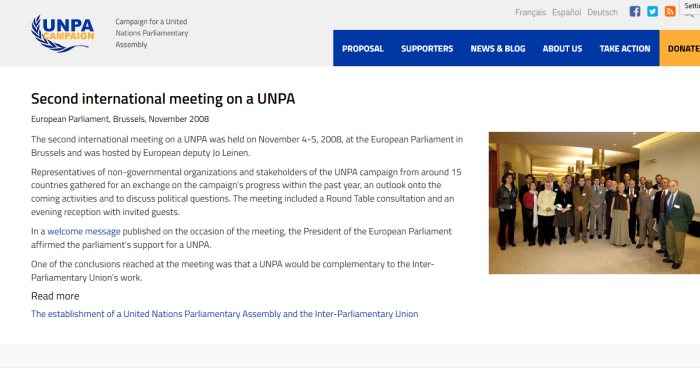
Second international meeting on a UNPA
European Parliament, Brussels, November 2008
The second international meeting on a UNPA was held on November 4-5, 2008, at the European Parliament in Brussels and was hosted by European deputy Jo Leinen.
Representatives of non-governmental organizations and stakeholders of the UNPA campaign from around 15 countries gathered for an exchange on the campaign’s progress within the past year, an outlook onto the coming activities and to discuss political questions. The meeting included a Round Table consultation and an evening reception with invited guests.
In a welcome message published on the occasion of the meeting, the President of the European Parliament affirmed the parliament’s support for a UNPA.
One of the conclusions reached at the meeting was that a UNPA would be complementary to the Inter-Parliamentary Union’s work.
Read more
The establishment of a United Nations Parliamentary Assembly and the Inter-Parliamentary Union
The establishment of a United Nations Parliamentary Assembly and the Inter-Parliamentary Union
At its meeting on 4-5 November 2008 in the European Parliament in Brussels, the Campaign for the Establishment of a United Nations Parliamentary Assembly (UNPA) deliberated on the relation between the proposed UNPA and the Inter-Parliamentary Union (IPU) and the possible roles and functions of the two parliamentary bodies.
The Campaign concluded that the proposed UNPA and the IPU would be complementary institutions. A UNPA would not replace or duplicate the IPU’s functions. Quite the contrary, a UNPA would provide a response to the democratic deficit in global governance which the IPU in its current structure is unable to offer.
The Campaign noted in particular:
(1) The IPU is an association of national parliaments. One of its activities is to provide for a “parliamentary dimension to international cooperation”. The IPU’s goal in this context is to strengthen the ability of national parliaments to exercise their oversight functions at the national level in matters of international nature. The Campaign underlines the importance of this dimension.
(2) The purpose of a UNPA is to exercise parliamentary functions directly at the international level in its own right. One of the goals is to make the UN executives and its institutions accountable to a global parliamentary body. The IPU has no such capacity and currently also does not aspire to develop such an oversight function.
(3) The IPU’s purpose is to be a facilitator for the work of national parliaments. In contrast, a UNPA would be composed of individual parliamentarians who would be called upon to take a global view.
(4) The precedent of the Pan-African Parliament and the African Parliamentary Union shows that the UNPA and the IPU need not be mutually exclusive.
(5) In the long run, a UNPA could be composed of directly elected members. The precedent of the European Parliament and the Conference of Community and European Affairs Committees of Parliaments of the European Union shows that a largely directly elected UNPA and the IPU would be complementary and indeed both necessary.
(6) The Campaign supports the work of the IPU and appreciates any and all active contributions from the IPU and IPU members in the efforts for the establishment of a UNPA.
7. Third UNPA Int’l Meeting in 2009
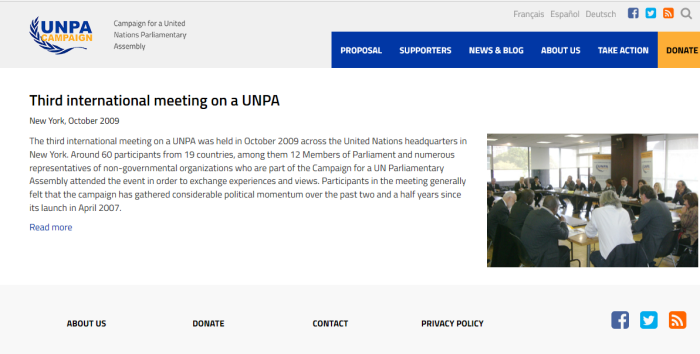
Third international meeting on a UNPA
New York, October 2009
The third international meeting on a UNPA was held in October 2009 across the United Nations headquarters in New York. Around 60 participants from 19 countries, among them 12 Members of Parliament and numerous representatives of non-governmental organizations who are part of the Campaign for a UN Parliamentary Assembly attended the event in order to exchange experiences and views. Participants in the meeting generally felt that the campaign has gathered considerable political momentum over the past two and a half years since its launch in April 2007.
Establishment of a global parliament discussed at international meeting in New York
30. October 2009
The progress of the international efforts for the establishment of a global parliamentary assembly was discussed at a meeting across the United Nations headquarters in New York. Around 60 participants from 19 countries, among them 12 Members of Parliament and numerous representatives of non-governmental organizations who are part of the Campaign for the Establishment of a United Nations Parliamentary Assembly (UNPA) attended the event on Monday in order to exchange their different experiences and views.
.
In her welcome remarks Senator Sonia Escudero, Secretary-General of the Latin-American Parliament, pointed out that the United Nations, established in 1945, “reproduces an age old international order.” Said Senator Escudero: “One of the challenges that the United Nations will have to face in order not to become obsolete is its own reform. It is imperative to undertake an integral reform of the United Nations taking into account that any representative institution, that is to say democratic institution, should have an structure that honours this characteristic. It is clear that the establishment of a UN Parliamentary Assembly would be a decisive step towards the democratic consolidation in the United Nations system.”
.
Jo Leinen, Member of the European Parliament, stressed the long-standing support of the European Parliament for the creation of a UNPA. The most recent resolution was adopted in June 2005. Mr Leinen noted that a new effort to reiterate the parliament’s support will be taken in the current new legislature. A representative of the Argentine Chamber of Deputies, Fernando Iglesias, reported on a resolution calling for a UNPA adopted by his parliament in August this year. Mr Iglesias promoted that the participants in the campaign reach out intensively to civil society and the academic world as well in order to build a broader base of public awareness. This approach was endorsed by Mike Sebalu, Member of the East African Legislative Assembly, saying that “it is crucial to reach critical mass of supporters from all walks of life.”
.
Presenting a report adopted by the Parliamentary Assembly of the Council of Europe (PACE) on the reform of the United Nations a few weeks ago, Andreas Gross, a Swiss Member of Parliament and leader of the Socialist Group in PACE, pointed out that the modernization of the UN should include by necessity a parliamentary dimension. Giving the example of the Council of Europe, Gross stressed that the UN runs the risk of becoming irrelevant in the long-term if no Parliamentary Assembly is established. “If the Council of Europe were a government organization alone, without a parliamentary body, its importance would have diminished completely by now,” Gross said.
.
The afternoon session concentrated, among other things, on a debate on the concept of a UN Parliamentary Assembly and, more in particular, models for the possible distribution of seats in a UNPA. The Chair of the Committee for a Democratic U.N., Andreas Bummel, presented a paper on the subject. He outlined that the report shows the feasibility of the proposal and that there are realistic and pragmatic options on the table. Joseph Schwartzberg, Professor emeritus of the University of Minnesota, presented his own incremental approach for the creation of a UNPA and elaborated on his suggestion to distribute seats according to population, equality, and share in UN membership dues. Andrew Strauss, Professor of Law at the Widener University School of Law, argued that a UNPA should be established through a stand-alone treaty rather than as a subsidiary body of the UN General Assembly.
.
Participants in the meeting generally felt that the campaign has gathered considerable political momentum over the past two and a half years since its launch in April 2007. The event was filmed by a crew led by Lisa Russell who recently won an Emmy Award and works on a documentary on U.S.-UN relations.
Okay, this is getting to be much more than theoretical. There are actual discussions on how the seats should be distributed should this Parliament ever become a reality.
8. Fourth UNPA Int’l Meeting in 2010
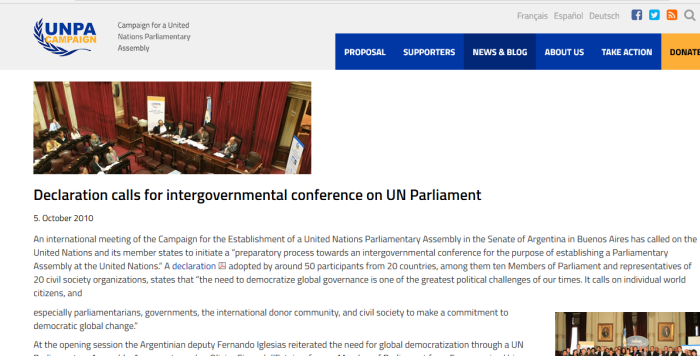
Declaration calls for intergovernmental conference on UN Parliament
.
5. October 2010
.
An international meeting of the Campaign for the Establishment of a United Nations Parliamentary Assembly in the Senate of Argentina in Buenos Aires has called on the United Nations and its member states to initiate a “preparatory process towards an intergovernmental conference for the purpose of establishing a Parliamentary Assembly at the United Nations.“ A declaration adopted by around 50 participants from 20 countries, among them ten Members of Parliament and representatives of 20 civil society organizations, states that “the need to democratize global governance is one of the greatest political challenges of our times. It calls on individual world citizens, and
.
Group picture of the participants
Image: Democracia Global
especially parliamentarians, governments, the international donor community, and civil society to make a commitment to democratic global change.”
.
At the opening session the Argentinian deputy Fernando Iglesias reiterated the need for global democratization through a UN Parliamentary Assembly. As a guest speaker Olivier Giscard d’Estaing, former Member of Parliament from France, voiced his disappointment over the enduring failure to bring about any substantial reform of the United Nations. Mr. Giscard d’Estaing called for the creation of “new world institutions dealing with world problems, including a world parliament.” The Executive Director of the World Federalist Movement-Institute for Global Policy, William Pace, severely criticized the G8 and G20. “These informal governance mechanism have failed dramatically,” Mr. Pace stated. “Our goal is to replace the brutality of imperialism with constitutional and parliamentary principles at the global level,” he said.
.
In a written welcome note to the meeting, the parliamentarian and former Prime Minister of Malta, Alfred Sant, stated that “the goal of establishing a UN Parliamentary Assembly may appear to be far away down the road, but global realities are changing so fast that the relevance of an Assembly may become salient much sooner than is now supposed.” The European parliamentarian Jo Leinen noted in a message that “the proposal now has to be taken up by a group of like-minded governments”.
.
In the plenary session, participants deliberated on the outcome document and on their activities in the previous year. In the afternoon, parallel workshops were held. The former clerk of the Pan-African Parliament, Werunga Murumba, now at the Centre for Parliamentary Studies and Training of the Kenya National Assembly, spoke about lessons learned from the creation of existing international parliamentary assemblies. Other workshops were held on the next steps in the Latin-American region and on the creation of a UN Parliamentary Assembly and UN Charter reform.
.
The event that was held in the premises of the Senate of Argentina on Monday was the fourth meeting of an international campaign that was launched in April 2007. The head of the Campaign’s Secretariat, Andreas Bummel, noted that in this time span around 900 Members of Parliament from over 90 countries expressed their support, representing over 100 million people from their constituencies. Around 750 are currently in office.
.
The meeting was preceded by a seminar of the Latin-American Parliament on regional integration and the reform of international institutions that was held in the previous week. One of the sessions was devoted to the proposal of a UN Parliamentary Assembly. The UNPA-Campaign meeting was part of a ten-day programme in Buenos Aires coordinated by the Argentinian non-governmental organization Democracia Global.
Again, more talks about how the logistics of such a proposal would work. Not a question of whether we should be doing this, or what the public might say. Rather, we agree, now let’s talk details.
9. Fifth UNPA Int’l Meeting in 2013
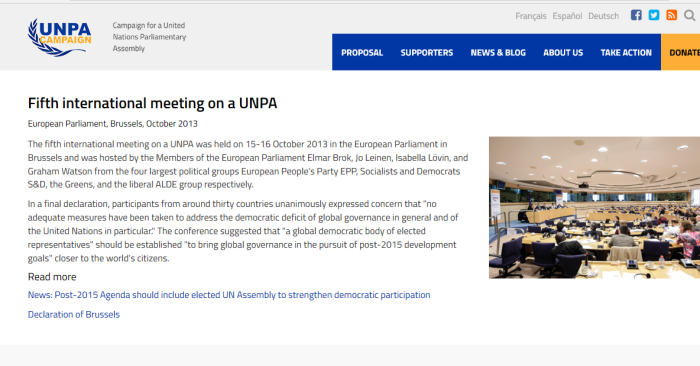
Fifth international meeting on a UNPA
European Parliament, Brussels, October 2013
The fifth international meeting on a UNPA was held on 15-16 October 2013 in the European Parliament in Brussels and was hosted by the Members of the European Parliament Elmar Brok, Jo Leinen, Isabella Lövin, and Graham Watson from the four largest political groups European People’s Party EPP, Socialists and Democrats S&D, the Greens, and the liberal ALDE group respectively.
In a final declaration, participants from around thirty countries unanimously expressed concern that “no adequate measures have been taken to address the democratic deficit of global governance in general and of the United Nations in particular.” The conference suggested that “a global democratic body of elected representatives” should be established “to bring global governance in the pursuit of post-2015 development goals” closer to the world’s citizens.
Post-2015 Agenda should include elected UN Assembly to strengthen democratic participation
22. October 2013
5th International Meeting of the Campaign for a UN Parliamentary Assembly concludes with declaration / Strong support from key Members of the European Parliament
The fifth international conference on a United Nations Parliamentary Assembly held in the European Parliament in Brussels on 16th and 17th October called on the United Nations and the international community to make democratic participation a key
One of the conference panels
Image: European Parliament
element of the Post-2015 Development Agenda.
In a final declaration, participants from around thirty countries unanimously expressed concern that “no adequate measures have been taken to address the democratic deficit of global governance in general and of the United Nations in particular.” The conference suggested that “a global democratic body of elected representatives” should be established “to bring global governance in the pursuit of post-2015 development goals” closer to the world’s citizens.
Conference hosted in the European Parliament
The conference was hosted by the Members of the European Parliament Elmar Brok, Jo Leinen, Isabella Lövin, and Graham Watson from the four largest political groups European People’s Party EPP, Socialists and Democrats S&D, the Greens, and the liberal ALDE group respectively. At the opening of the conference, Elmar Brok who serves as chairman of the European Parliament’s Commission on Foreign Affairs stated that a consultative UN Parliamentary Assembly would “allow world civil society to be directly associated in the global decision-making process.”
Jo Leinen who is a co-chair of the advisory board of the international campaign for a UN Parliamentary Assembly emphasized that until now no formal body exists that would give citizen-elected representatives a say in global governance. At best they had an observer status. “This is not acceptable,” said Mr Leinen. “In a democratic system, the representatives of the citizens are not observers of what the governments do. They should provide oversight and hold the government executives accountable.”
At a panel discussion Isabella Lövin used the example of the global fishery policy to show that the system of international governance is dysfunctional. “It’s still governed by 16th century principles,” she said. Graham Watson pointed out that “there will be times when national interests and global interests collide. A UN Parliamentary Assembly could act as an arbiter and ensure that the voice of the world’s citizens is heard.“
In a message issued on the occasion of the conference, the President of the European Parliament, Martin Schulz, emphasized the longstanding support for the proposal by the European Parliament. In addition, he declared that “The European Parliament may serve as a model for how a UN Parliamentary Assembly could develop over time. What once began as an advisory body composed of national parliamentarians is a directly elected legislature today.”
Consultation with the UN’s Independent Expert
A similar position was taken by the UN’s Independent Expert on the Promotion of a Democratic and Equitable International Order, Alfred de Zayas, who was participating as a special guest. In a statement delivered at a special consultation, he confirmed that “Participation is a hallmark of democratic governance” and that “civil society is entitled to more space.” He said that the establishment of a World Parliamentary Assembly was “a promising avenue” to achieve this and could be modelled according to the example of the European Parliament. Mr de Zayas pointed out that his upcoming report to the UN General Assembly includes the recommendation that it “may consider convening a conference to discuss promising initiatives such as the creation of a World Parliamentary Assembly.”
In a comment following the statement by Mr de Zayas, the Member of the European Parliament and chairperson of Democracy International, Gerald Häfner, said that “We cannot leave the world to decision-making that is in the interest of big money or big powers – but not in the interest of the world’s citizens. A UN Parliamentary Assembly is a first step to establish global democracy.”
The final declaration adopted by the conference welcomes “the decision of the UN’s Human Rights Council to mandate an Independent Expert on the Promotion of a Democratic and Equitable International Order,” and encourages the Independent Expert “to keep considering the question of a UNPA and in particular to examine possible processes towards its creation.”
.
Main points of the final declaration
In the discussion the Secretary-General of the campaign for a UN Parliamentary Assembly, Andreas Bummel, emphasized three elements in the final declaration: That it puts the proposal for a UN Parliamentary
Gathering in front of the European Parliament
Image: CEUNPA
Assembly in the context of the Post-2015 Development Agenda, that it highlights the possibility of having a UN Parliamentary Assembly act as a “network of networks” and finally that the document says that “innovative forms of civic participation” in a UNPA through models of electronic democracy could be considered. In its last session, the conference also deliberated on a possible roadmap towards a UN Parliamentary Assembly as well as on the campaign’s goals and strategy.
Other speakers at the conference included, among others, Andrew Strauss from Widener University School of Law in the United States, the UN’s representative in Brussels, Antonio Vigilante, the Member of the European Parliament and President of the Union of European Federalists Andrew Duff, the European Parliament’s Vice-President Anni Podimata, Swiss parliamentarian Daniel Jositsch as well as Juan Behrend as representative of the Global Greens Coordination, Gregory Engels as representative of Pirate Parties International, and Hanno Schedler of the Society for Threatened Peoples.
Week of Action for a World Parliament
The conference was also a kick-off event for the Global Week of Action for a World Parliament that takes place until UN day on 24 October. At the end of the conference participants gathered in front of the European Parliament at Place du Luxembourg in Brussels and displayed the week’s slogan, “World Parliament Now!”
Okay, the United Human Rights Council will have a say in matters here. Considering the members on it, that is not at all encouraging.
Some alleged “research” is presented elsewhere on the website, claiming that there is widespread support across nations for a global government. Seems rather self serving.
10. Duplicity Of “Populist” Maxime Bernier
This wasn’t in the original version, but worth pointing out to the readers.
Maxime Bernier, a self-identified “populist” left the Conservative Party of Canada in August 2018 and started the People’s Party of Canada. Despite its Communist sounding name, it is marketed as a nationalist/populist party.
The problem is that Bernier was Foreign Affairs Minister in 2007, when this issue was being discussed. Very unethical to remain silent for 12 years, and now claim to oppose it.
While this petition seems to be a welcome change, it cannot be taken at face value. Bernier introduces a petition to prevent Canada from joining any such organization, despite his Committee earlier endorsing it.

